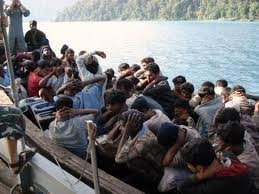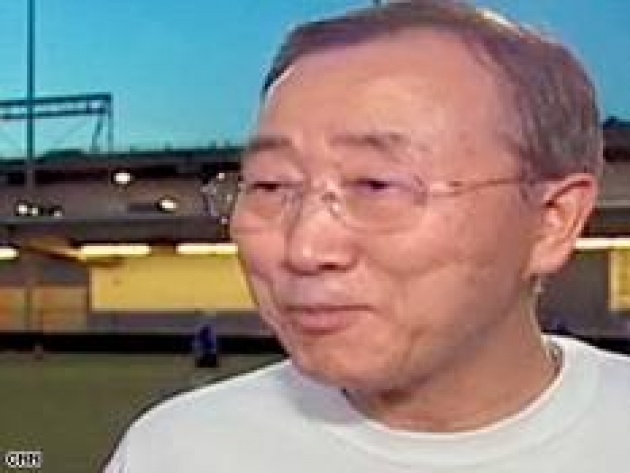


If the Rohingya were not people but an animal species, they would have a spot on the endangered list and maybe even a celebrity spokesperson. Actually, Angelina Jolie, to her credit, was one that did try to focus attention on the plight of the Rohingya only to have the Thai Government complain to the UN about her complaints on the treatment of Rohingya refugees escaping Myanmar to Thailand.
If it were not so tragic, this column might turn in the direction of humor. Unfortunately though it has not gotten better and probably worse. The Rohingya are people but continue to be treated like animals.
The Rohingya are a Muslim minority in Myanmar. It’s bad enough to be part of the Buddist majority in this long-running horror film of a military dictatorship, but a minority that has been characterized by a high ranking Myanmar diplomat as too dark and too ugly to be Burmese, it can only be surreal.
-----
"UGLY AS OGRES" - FROM THE BANGKOK POST - 12-02-2009
"Hong Kong (AFP) - The top Burmese official in Hong Kong has described the Rohingya people as "ugly as ogres" in a letter sent to media and foreign officials after a high-profile refugee case highlighted their plight.
The country's Consul General Ye Myint Aung told heads of foreign missions in Hong Kong and local newspapers members of the Muslim ethnic group should not be described as being from Burma.
"In reality, Rohingya are neither (Burmese) people nor Myanmar's ethnic group," he wrote, in a letter seen by reporters on Wednesday. "Myanmar" is the military junta's name for Burma.
The envoy contrasted the "dark brown" Rohingya complexion with the "fair and soft" skin of people from Burma, which he said was "good looking as well".
In a letter liberally punctuated with brackets, Ye Myint Aung continued: "(My complexion is a typical genuine one of a Myanmar gentleman and you will accept that how handsome your colleague Mr Ye is.) It is quite different from what you have seen and read in the papers. (They are as ugly as ogres)."
-----
The problem gets worse: as the Rohingya are pushed out, ethnically cleansed from Myanmar, they are not particularly welcome in neighboring states including Thailand and increasingly Bangladesh.
Below is an article I wrote over two years earlier on the plight of the Rohingya and a more recent IRIN News - from the UN Office for the Coordination of Humanitarian Affairs. I just figure that I can’t forget these people when two years earlier I (and Angelina) were reminding the world not to forget them. Well, they are almost forgotten, again!
By Ambassador Muhamed Sacirbey
FaceBook at “Diplomatically Incorrect”
Twitter - DiplomaticallyX
“PLEASE BROTHER, PLEASE!” from February 2009 – with Transcript of CNN
Rohingya People Targeted: "Please Brother, Please!"
The Rohingya minority of Burmam, (Mynamar), is the latest targeted group to come to be seen as probable victims of abuse and perhaps genocide. What caught my attention is that refugees escaping and being ethnically cleansed from Burma are now being abused by other regional governments, or at least irresponsible officials and authorities. CNN documented systematic violations as refugees reaching Thailand were first abused, perhaps beaten and denied critical care, but worse were then hauled out miles to open ocean and left adrift in overcrowded, non-seaworthy rafts. What compelled me to write this story is the simple plea of one young refugee staring into a CNN camera but speaking to all of us: "Please Brother, Please!"
For more on the Rohingya:
www.rohingya.org/
For CNN story go to CNN.com (below is transcript of January 26, 2009 story):
DAN RIVERS, CNN INTERNATIONAL CORRESPONDENT (voice-over): They look like logs, but these are people, dozens of Burmese refugees detained on a Thai beach. These photos were provided to CNN last week, as three different tourists voiced concern about the way the Thai authorities were treating these migrants.
ANDREW CATTON, TOURIST: Whenever someone raised their head or sat up, they'd strike them with a whip.
RIVERS: So we traveled to a remote stretch of the Thai coast four hours' drive north of the holiday island of Phuket, keen to investigate local reports the Thai military had been secretly detaing Burmese Rohingya refugees here before towing them back far out to see and leaving them to drift.
Koh Sae Daeng is uninhabited, part of the national park. But there was plenty of evidence that large numbers of people had been detained here. This man helped the army guard the refugees for one night on the island.
"We treated them well," he says. "We gave them food and whatever they asked for."
(on camera): There seems a lot of evidence that a large number of Rohingya refugees were indeed camped out here at Koh Sae Daeng. All around there are discarded shoes and clothes. There's several campfires that look fairly fresh here, as well as food wrapping as well.
But the big question is, how did the Rohingya leave? Did they leave voluntarily or were they towed out to sea by the military?
(voice-over): On a nearby island, we find one of the distinctive Rohingya boats on the shore. The Rohingya are a persecuted Muslim minority who have been fleeing Myanmar in rickety boats like these for years looking for a better life. This proves how they arrived but not how they left.
We travel to another island where villagers told us about some Rohingya refugees who had escaped and were living in the jungle. We were keen to talk to the refugees to hear their story. We didn't have to wait long.
That night, a local army-trained village defense force took us on patrol. We hurried to a hamlet after reports they caught one of the migrants. This is what we found -- villagers had captured a Rohingya man who they think had been living in the jungle for days.
UNIDENTIFIED MALE: Please, brother.
RIVERS: He was clearly distressed.
UNIDENTIFIED MALE: Please!
RIVERS: Over the next three hours we tried to piece together his story.
UNIDENTIFIED MALE: All men?
UNIDENTIFIED MALE: Dead.
UNIDENTIFIED MALE: Dead.
RIVERS: He was taken back to the port where he continued to try and communicate with us.
Through a combination of broken English, sign language and drawings, he told his name was Ichbal Hussein (ph) and he was on one of six refugee boats which arrived in December. He said they were towed back out to see sea in January, but five of the six boats sank. His, he said, made it back to shore.
But this is the final piece of evidence. Photos were given to CNN by someone involved in what he said was an ongoing Thai operation to tow refugees out to sea.
They show refugees being processed on the Koh Sae Daeng, the same camp that we visited. And incredibly, this shows the Thai army towing a boatload of some 190 refugees far out to see.
The source who gave us these photos says they provided them with food and water. Another source in the military confirmed they have been towing refugees out to sea, again stressing they gave them supplies. Neither would appear on camera for fear of repercussions.
We asked the Thai government about our findings and it says it is investigating. A sign of how embarrassing these photos may be considered, it says the prime minister will receive a full report this week.
These are the last images of the refugee boat as it disappears over the horizon. Neither this boat, nor the refugees aboard it have been seen since.
Dan Rivers, CNN, on Koh Sae Daeng, Thailand.
(END VIDEOTAPE)
BANGLADESH: NEW ID CARD POLICY COULD HIT ROHINGYA ASYLUM-SEEKERS – from IRIN March 29, 2011
DHAKA, 29 March 2011 (IRIN) - The introduction of national ID cards may lead to further institutionalized discrimination of Burmese Rohingya asylum-seekers (unregistered refugees) living in southeastern Bangladesh, experts warn.
A report by US-based NGO Refugees International to be released next month is expected to highlight how lack of access to public services and gainful employment for non-ID card holders will contribute to severe food insecurity for the Rohingyas. (Read Full -
www.irinnews.org/report.aspx?reportid=92302 )





